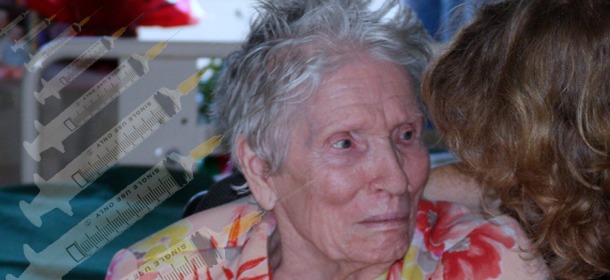Conventional Med
New Baldness Drug Goal Likely to Cause Major Disorders
 Research on the horrors of baldness—sarcasm intended—has discovered a presumed flaw in basic biology that researchers believe is a new target for treatment. So, of course, in their zeal to find a way to change the natural course of aging, they intend to find a drug that can control what, in their hubris, they’ve decided is a flaw in a person’s basic biology.
Research on the horrors of baldness—sarcasm intended—has discovered a presumed flaw in basic biology that researchers believe is a new target for treatment. So, of course, in their zeal to find a way to change the natural course of aging, they intend to find a drug that can control what, in their hubris, they’ve decided is a flaw in a person’s basic biology.
They’ve found that the hair follicles in mostly bald areas have more of a protein called prostaglandin D synthase (PGD2) than follicles in hairy areas. Of course, since they like to play at being gods, they figure that it’s quite all right to manipulate that protein. There’s absolutely no consideration for the fact that it does far more than act as a marker for baldness.
The study, Prostaglandin D2 Inhibits Hair Growth and Is Elevated in Bald Scalp of Men with Androgenetic Alopecia, published in the journal Science Translational Medicine, found that PGD2 increases in lab mice shortly before hair is shed. According to BBC News George Cotsarelis,professor of dermatology at the University of Pennsylvania and chief of the research team, stated:
Essentially we showed that prostaglandin protein was elevated in the bald scalp of men and that it inhibited hair growth. So we identified a target for treating male-pattern baldness.
The next step would be to screen for compounds that affect this receptor and to also find out whether blocking that receptor would reverse balding or just prevent balding—a question that would take a while to figure out.
Notice that there’s no concern for the full range of effects that PGD2 might have, merely concern for how big a range of activity it has on baldness. So, let’s do his work for him.
Function of Prostaglandin D Synthase
PGD2 is necessary for synthesizing arachidonic acid, which is an essential omega-6 fatty acid. It’s found in cell membranes and is abundant in the brain, muscles, and liver. More specifically, arachidonic acid is needed for:
- Repair and growth of skeletal muscles.
- Brain health: Insufficient levels can lead to brain damage.
- Muscle health: Arachidonic acid is well known to body builders, who supplement with it to improve muscle building, muscle strength, and muscle endurance.
- Mediator of inflammation, both reducing and increasing it.
To attempt to control baldness by controlling PGD2 is clearly madness. It means that the researchers—and, of course, Big Pharma—are willing to take enormous risks with health in the ongoing rush to increase profits.
Will reducing PGD2 result in stupid men with flaccid muscles, no endurance, and massive inflammation, but with glorious heads of hair? Does it even make sense to find out?
Tagged baldness, baldness drugs, baldness pgd, conventional medicine, modern medicine, pgd2, pharmaceutical drugs, pharmaceuticals, prostaglandin, pseudo-science, pseudoscience, science
Related Posts
-
Alireza Hosseini
-
Heidi Stevenson
-
squibble
-
-
Rsquaredg
-
Mitch
-
HeidiStevenson
-
-
Dlewis1498
-
sermodur
-
HeidiStevenson
-
-
Obrie126
-
Simon155
-
http://www.facebook.com/people/Tom-Saueracker/1000568243 Tom Saueracker
-
poop
-
VanBrah













